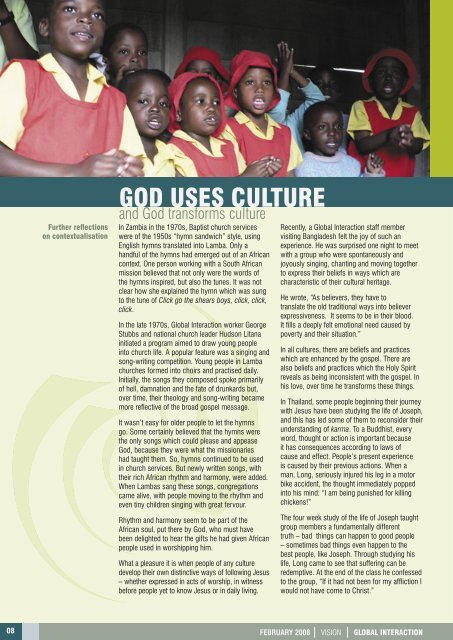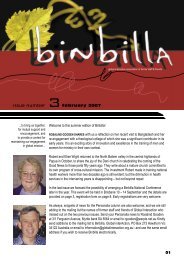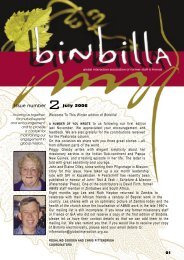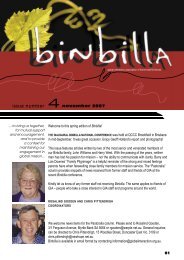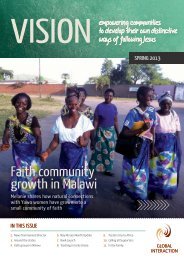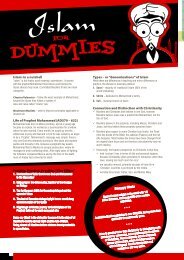presenting the unchanging gospel in forms ... - Global Interaction
presenting the unchanging gospel in forms ... - Global Interaction
presenting the unchanging gospel in forms ... - Global Interaction
Create successful ePaper yourself
Turn your PDF publications into a flip-book with our unique Google optimized e-Paper software.
Fur<strong>the</strong>r refl ections<br />
on contextualisation<br />
GOD USES CULTURE<br />
and God trans<strong>forms</strong> culture<br />
In Zambia <strong>in</strong> <strong>the</strong> 1970s, Baptist church services<br />
were of <strong>the</strong> 1950s “hymn sandwich” style, us<strong>in</strong>g<br />
English hymns translated <strong>in</strong>to Lamba. Only a<br />
handful of <strong>the</strong> hymns had emerged out of an African<br />
context. One person work<strong>in</strong>g with a South African<br />
mission believed that not only were <strong>the</strong> words of<br />
<strong>the</strong> hymns <strong>in</strong>spired, but also <strong>the</strong> tunes. It was not<br />
clear how she expla<strong>in</strong>ed <strong>the</strong> hymn which was sung<br />
to <strong>the</strong> tune of Click go <strong>the</strong> shears boys, click, click,<br />
click.<br />
In <strong>the</strong> late 1970s, <strong>Global</strong> <strong>Interaction</strong> worker George<br />
Stubbs and national church leader Hudson Litana<br />
<strong>in</strong>itiated a program aimed to draw young people<br />
<strong>in</strong>to church life. A popular feature was a s<strong>in</strong>g<strong>in</strong>g and<br />
song-writ<strong>in</strong>g competition. Young people <strong>in</strong> Lamba<br />
churches formed <strong>in</strong>to choirs and practised daily.<br />
Initially, <strong>the</strong> songs <strong>the</strong>y composed spoke primarily<br />
of hell, damnation and <strong>the</strong> fate of drunkards but,<br />
over time, <strong>the</strong>ir <strong>the</strong>ology and song-writ<strong>in</strong>g became<br />
more refl ective of <strong>the</strong> broad <strong>gospel</strong> message.<br />
It wasn’t easy for older people to let <strong>the</strong> hymns<br />
go. Some certa<strong>in</strong>ly believed that <strong>the</strong> hymns were<br />
<strong>the</strong> only songs which could please and appease<br />
God, because <strong>the</strong>y were what <strong>the</strong> missionaries<br />
had taught <strong>the</strong>m. So, hymns cont<strong>in</strong>ued to be used<br />
<strong>in</strong> church services. But newly written songs, with<br />
<strong>the</strong>ir rich African rhythm and harmony, were added.<br />
When Lambas sang <strong>the</strong>se songs, congregations<br />
came alive, with people mov<strong>in</strong>g to <strong>the</strong> rhythm and<br />
even t<strong>in</strong>y children s<strong>in</strong>g<strong>in</strong>g with great fervour.<br />
Rhythm and harmony seem to be part of <strong>the</strong><br />
African soul, put <strong>the</strong>re by God, who must have<br />
been delighted to hear <strong>the</strong> gifts he had given African<br />
people used <strong>in</strong> worshipp<strong>in</strong>g him.<br />
What a pleasure it is when people of any culture<br />
develop <strong>the</strong>ir own dist<strong>in</strong>ctive ways of follow<strong>in</strong>g Jesus<br />
– whe<strong>the</strong>r expressed <strong>in</strong> acts of worship, <strong>in</strong> witness<br />
before people yet to know Jesus or <strong>in</strong> daily liv<strong>in</strong>g.<br />
Recently, a <strong>Global</strong> <strong>Interaction</strong> staff member<br />
visit<strong>in</strong>g Bangladesh felt <strong>the</strong> joy of such an<br />
experience. He was surprised one night to meet<br />
with a group who were spontaneously and<br />
joyously s<strong>in</strong>g<strong>in</strong>g, chant<strong>in</strong>g and mov<strong>in</strong>g toge<strong>the</strong>r<br />
to express <strong>the</strong>ir beliefs <strong>in</strong> ways which are<br />
characteristic of <strong>the</strong>ir cultural heritage.<br />
He wrote, “As believers, <strong>the</strong>y have to<br />
translate <strong>the</strong> old traditional ways <strong>in</strong>to believer<br />
expressiveness. It seems to be <strong>in</strong> <strong>the</strong>ir blood.<br />
It fi lls a deeply felt emotional need caused by<br />
poverty and <strong>the</strong>ir situation.”<br />
In all cultures, <strong>the</strong>re are beliefs and practices<br />
which are enhanced by <strong>the</strong> <strong>gospel</strong>. There are<br />
also beliefs and practices which <strong>the</strong> Holy Spirit<br />
reveals as be<strong>in</strong>g <strong>in</strong>consistent with <strong>the</strong> <strong>gospel</strong>. In<br />
his love, over time he trans<strong>forms</strong> <strong>the</strong>se th<strong>in</strong>gs.<br />
In Thailand, some people beg<strong>in</strong>n<strong>in</strong>g <strong>the</strong>ir journey<br />
with Jesus have been study<strong>in</strong>g <strong>the</strong> life of Joseph,<br />
and this has led some of <strong>the</strong>m to reconsider <strong>the</strong>ir<br />
understand<strong>in</strong>g of karma. To a Buddhist, every<br />
word, thought or action is important because<br />
it has consequences accord<strong>in</strong>g to laws of<br />
cause and effect. People’s present experience<br />
is caused by <strong>the</strong>ir previous actions. When a<br />
man, Long, seriously <strong>in</strong>jured his leg <strong>in</strong> a motor<br />
bike accident, <strong>the</strong> thought immediately popped<br />
<strong>in</strong>to his m<strong>in</strong>d: “I am be<strong>in</strong>g punished for kill<strong>in</strong>g<br />
chickens!”<br />
The four week study of <strong>the</strong> life of Joseph taught<br />
group members a fundamentally different<br />
truth – bad th<strong>in</strong>gs can happen to good people<br />
– sometimes bad th<strong>in</strong>gs even happen to <strong>the</strong><br />
best people, like Joseph. Through study<strong>in</strong>g his<br />
life, Long came to see that suffer<strong>in</strong>g can be<br />
redemptive. At <strong>the</strong> end of <strong>the</strong> class he confessed<br />
to <strong>the</strong> group, “If it had not been for my affl iction I<br />
would not have come to Christ.”<br />
08 FEBRUARY 2008 | VISION | GLOBAL INTERACTION


